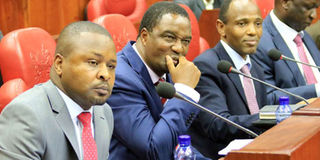Sugar in Kenyan market has no heavy metals, says Kebs

Kenya Bureau of Standards (Kebs) directors from left: Moses Kihara, Geoffrey Muriira, Bernard Nguyo, and Henry Kibet appear before the joint Trade and Agriculture committee on July 3, 2018. Kebs says it has not detected elements of heavy metals in samples of the sugar it collected from the local market and tested so far. PHOTO | JEFF ANGOTE | NATION MEDIA GROUP
What you need to know:
- Kenya Bureau of Standards has tested some 53 samples from 17 counties.
- Dr Ikiara said of the 53 samples, 38 complied with the standards— representing 72 per cent conformity.
- Dr Ikiara said Kebs detected copper and lead in two samples from sugar seized in Eastleigh and Ruiru.
- Of the 1,319,668, 50-kg bags seized by the multi-agency team in various parts of Kenya, Kebs said it had tested 66 samples representing 1,266,351 50-kg bags.
Kenya Bureau of Standards says it has not detected elements of heavy metals in samples of the sugar it collected from the local market and tested so far.
Appearing before the joint sitting of the National Assembly committees on Trade and Industry, Kebs acting Managing-Director Moses Ikiara on Tuesday said their tests did not reveal any traces of Mercury, arsenic, lead and copper.
So far, he said they have tested some 53 samples that were sourced from 17 out of Kenya’s 47 counties.
The counties are Embu, Kajiado, Kilifi, Kwale, Machakos, Makueni, Murang'a, Nairobi and Nandi. Others are Nyeri, Taita Taveta, Uasin Gishu, Kiambu, Kakamega, Mombasa and Lamu.
Dr Ikiara said of the 53 samples, 38 complied with the standards— representing 72 percent conformity.
MOISTURE
But 15 samples failed the exam of moisture, yeast and mould, colour, total viable count and polarisation, according to the acting MD.
Additionally, Dr Ikiara said Kebs detected copper and lead in two samples from sugar seized in Eastleigh and Ruiru, which had not been released into the local market.
The samples came from suspected bad sugar that was detained at DCI headquarters on Kiambu Road.
He said no other samples tested by Kebs had shown the presence of the heavy metals in sugar in the Kenyan market.
Of the 1,319,668, 50-kg bags seized by the multi-agency team in various parts of Kenya, Kebs said it had tested 66 samples representing 1,266,351 50-kg bags.
REPROCESSING
After tests so far, 157,392 bags have been found to have complied with the standards but 837,244 did not.
Of the lot that failed to meet the requirements, 705,000 bags were sugar meant for reprocessing, which makes it compliant, according to the MD.
The samples failed to meet moisture content, yeast and moulds, colour, total viable count and polarisation requirements.
The sugar that failed tests so far was in bags marked Brazilian raw sugar, Diamond Wholesalers and Kabras, according to Bernard Nguyo, Kebs director in charge of quality and assurance.
He said that sugar seized from Diamond Wholesalers Limited go-downs was stored in sordid conditions.





